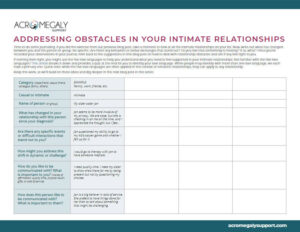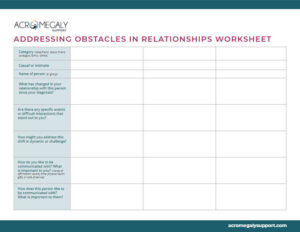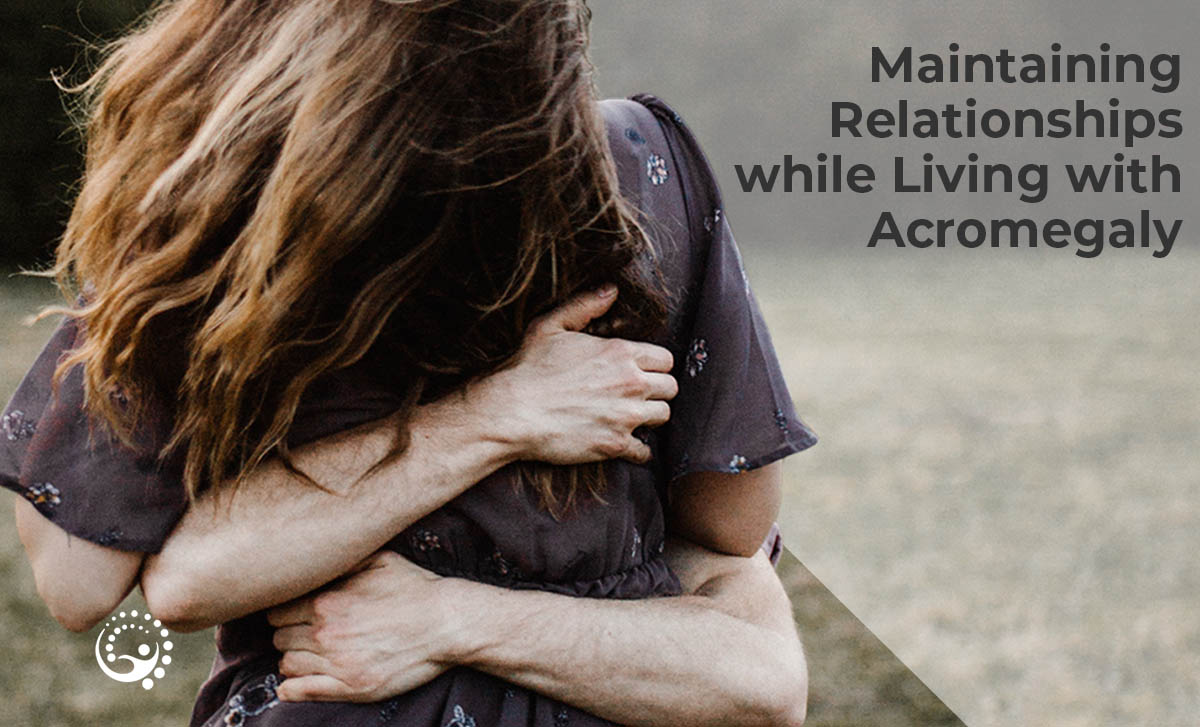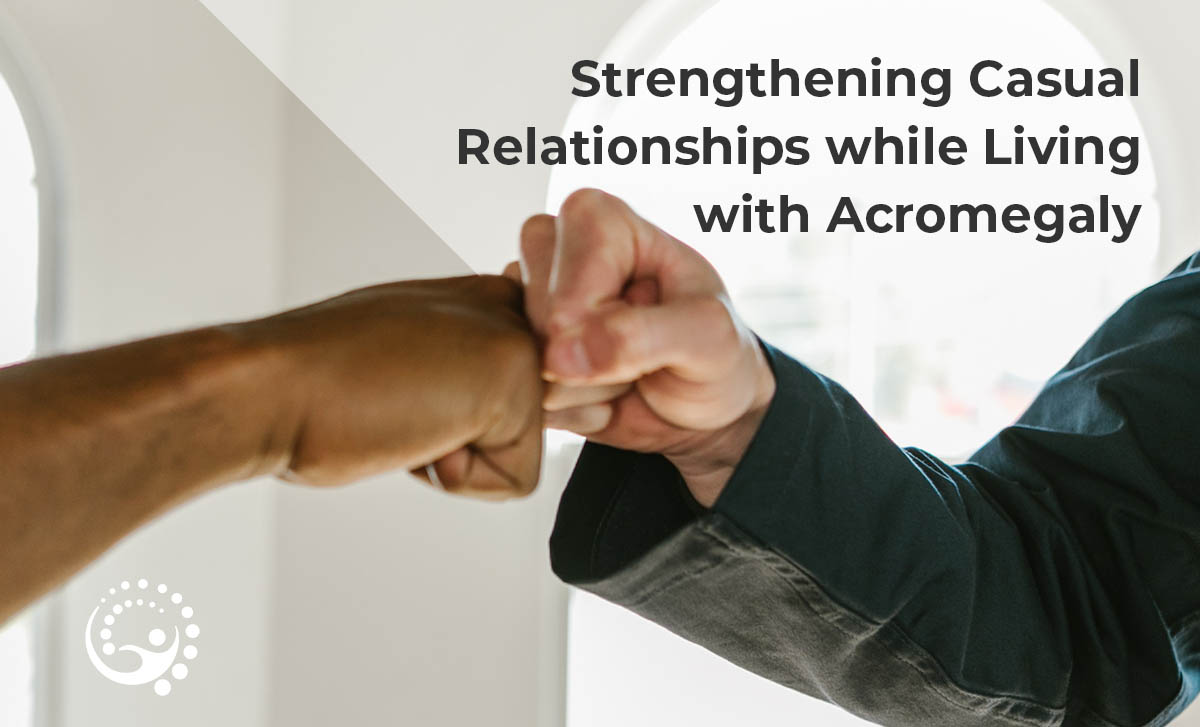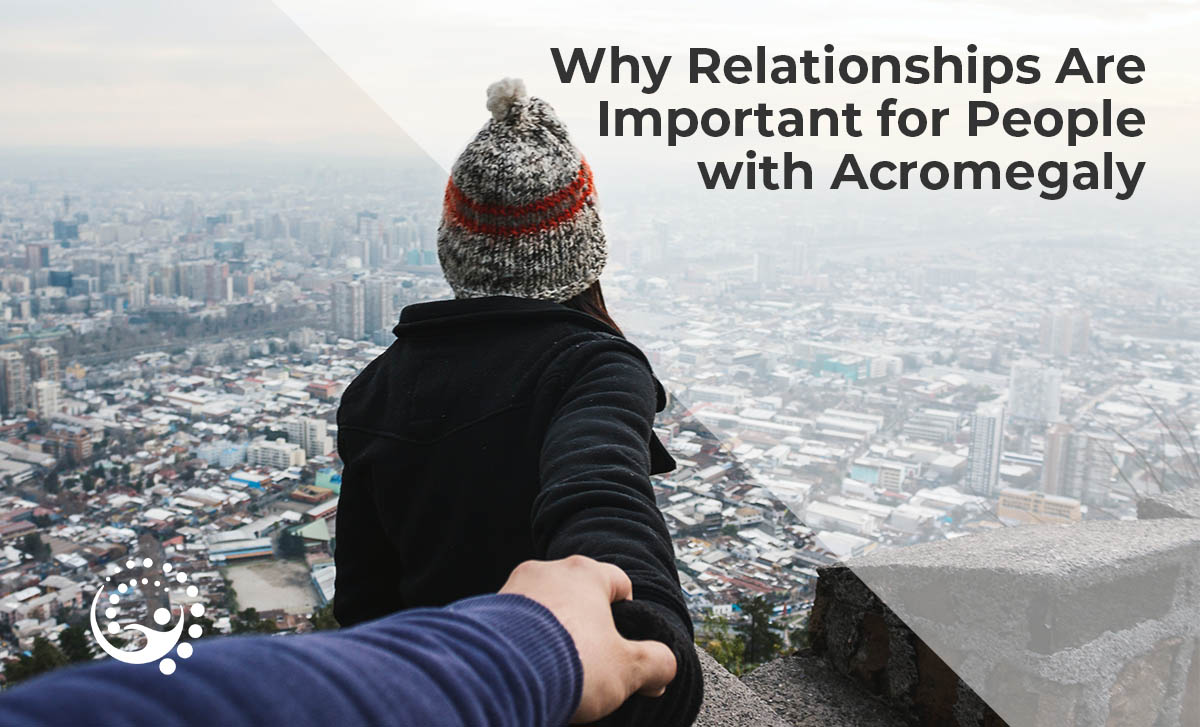As someone living with acromegaly, you’ve likely experienced changes in your close relationships leading up to and after your diagnosis. It’s very common for the many doctors’ appointments, tests, and effects of symptoms such as mood swings and fatigue to create emotional strain for you, your family, and close friends. According to a survey conducted by Acromegaly Community 49% of respondents felt that acromegaly “interferes with their social interaction and participation,” and 33% said it affects their family relationships.
While these stats might seem scary, know that an acromegaly diagnosis does not need to be the end of your relationships and social life. By having honest and direct conversations with family members and close friends about the physical, emotional, and mental effects of your symptoms, you can maintain these relationships, and even strengthen them. This kind of open and honest communication can help bring you closer to people, even if it feels uncomfortable in the moment.
This post explores how acromegaly may affect your intimate interpersonal relationships and offers ways to address these changes, so you feel supported, empowered, and in control. Just as it takes time to receive your acromegaly diagnosis, it may also take time to find a new normal for your close relationships—but there is indeed light at the end of the tunnel.
How Acromegaly Can Affect Intimate Relationships
Before we continue, a note on terminology: the words “intimate” or “intimacy” don’t just refer to romantic relationships or sex. As Linda Rio, MA, MFT, says, “I look at intimacy as being on a continuum. It can include physical touch, but it can also include emotional connection. It includes all forms of relationships…and it’s necessary as human beings. It’s built into our needs, and it can add to the breadth and depth of our quality of life.” With that in mind, and referencing our list from blog one in the series, here are some examples of how acromegaly may affect your intimate relationships:
Spouse/partner: Physical changes in your appearance and a lack of energy can make you feel less like yourself and more sensitive to physical touch. Furthermore, hormone-induced mood swings or “acro-rage” can negatively affect physical and emotional intimacy between partners. Even people who are not living with a rare disease can feel uncertain or hesitant in romantic relationships if they compare themselves unrealistic expectations of what intimacy and romance should look like, such as always being happy or feeling passionate. However, there is no “right” way to express intimacy; instead, it’s about what you and your partner feel matters most and how it makes you both feel.
Person you’re dating: Fatigue, physical limitations, or a change in physical appearance may make an existing relationship harder for you or even make you want to avoid dating in the first place. If you decide to date, you might feel unsure how much to disclose about your condition and when. You may also expect rejection, affecting your self-esteem and behavior in current and future relationships.
Family: If you have chronic fatigue, you may miss out on or severely limit the time spent with your family and friends. Some people with acromegaly have said that not being able to hold down their jobs made them feel like they weren’t providing for themselves or their family, which can cause emotional strain. Limited energy and frequent visits to the doctor can also change daily routines, which can be hard on family members, especially children or adolescents.
Close friends: Friends may not understand or believe you when you say you’re too tired to attend a party or other social gathering. And close friends who are deeply involved in caregiving duties such as providing emotional support or driving you to doctors’ appointments may experience burnout.
Addressing Relationships Obstacles When Living With Acromegaly
If reading about all these changes was tough, take a deep breath. While your relationships are changing, there are opportunities for them to evolve into something new that fulfills the emotional needs of both parties. And in the process, you may also find compassion for yourself and your loved ones as you both navigate your acromegaly journey.
Consult a Therapist
Therapy can help you address the mental, emotional, and physical effects acromegaly has on all kinds of relationships, including the one with your spouse or partner. For example, many people find it hard to talk about sex or intimacy with their significant other, especially if some physical changes make them feel awkward. A therapist can help you find the language to work through these obstacles. Families can also participate in therapy either in private sessions or through group therapy sessions for family members of people with a rare disease.
“People don’t always realize that being able to sit down and talk about what it’s like to live with a rare disease often requires the help of a therapist. It can help put people at ease, provide some words, and normalize experiences. It can be tremendously helpful.”
–Linda Rio, MA, MFT
Seeing a therapist can be intimidating; sharing your experiences of living with acromegaly and how it affects you requires vulnerability. However, a great therapist will ease you into those difficult conversations and allow you to take things at your own pace. You can even find a therapist who has experience working with people with rare diseases such as acromegaly.
Prioritize Fun
What does fun look like to you? When was the last time you had fun? If your acromegaly diagnosis prevents you from participating in activities that used to bring you joy, finding ways to enjoy life within your current abilities can seem challenging. However, prioritizing fun can ultimately lighten the emotional burden of living with acromegaly.
You could try:
- Going for a walk with a friend, partner, spouse, or the person you’re dating
- Spending time with a pet
- Calling someone you haven’t talked to in a while and catch up
- Cooking a new recipe with your partner
- Having a board game night with a few close friends
- Watching a movie or show with a friend or partner
- Taking an art class with your kids
- Scheduling a “friend date” once a month or at a frequency that works for you
Even when you feel like doing nothing, it’s best to just get out and try something—it doesn’t have to be fancy!
Rekindle Romance
Has the spark fizzled in your relationship? Even those who are not living with acromegaly experience the loss of this spark from time to time. Be gentle with yourself and your partner. Take baby steps to rebuild and strengthen the physical and emotional intimacy with your partner. As an example, think back to what you and your partner did when you first started dating. Did you love movies? Picnics in the park? Bringing some of these activities back into your routine is helpful, Rio says, as it can help things feel fresh and fun again.
Remember, romance isn’t only about sex. Take a moment to notice what it feels like to sit next to your partner or simply hold their hand. Physical touch, in any quantity, can have a profound impact on your happiness; when you hug someone or even share a brief touch on the shoulder, oxytocin (known as the “cuddle hormone”) is released, giving you positive feelings.
Of course, physical touch doesn’t have to be romantic; you can hug a friend, a child, pets, or other family members and reap similar happiness benefits.
If you’re thinking, “OK, but how can I apply these ideas to my current intimate relationships?” download the free exercise resource “Addressing Obstacles In Your Intimate Relationships.” Living with acromegaly is difficult, but by fostering open and honest communication (and having fun!) with the people closest to you, you can feel more supported and in control of your relationships.
Now that you know how to approach challenges in your close social connections, the next post will explore how your acromegaly diagnosis might affect casual relationships, why they’re important, and how you can address any challenges you might face.
Was this information helpful to you? If so, please share with others and subscribe to receive the latest content.


